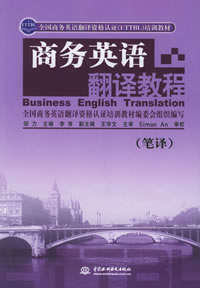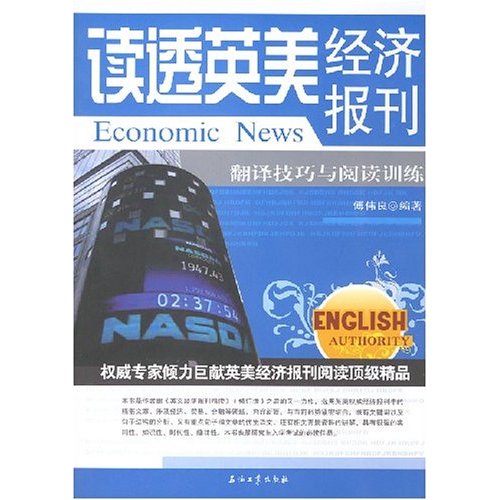Getting Started as a Translator:Gleanings from Honyaku (第四部分)
作者:古龙 2009-07-04




语际翻译公司 转载请注明https://www.scientrans.com
∗本栏目部分文章内容来自互联网,部分已经过本站编辑和整理,如有版权事宜请联系Email/MSN jesczhao@hotmail.com
John Marchioro
________________________________________
John is exaggerating when he says you need to have a specialty "if you hope to make a living as a translator". I agree that it is beneficial to have a specialty, and I enjoy the medical and biotech translation that I do, but there are plenty of people who make a living as generalists. It's a matter of needs and temperament (and knowledge).
Zachary Braverman
________________________________________
Zachary is right. I do not have any particular technical specialty myself, since my own background is in the social sciences and it has been of little help for most of the translation work I do (the occasional academic paper aside). I regularly lament the fact that I took so few natural sciences courses as an undergrad.
But I do think this bit of advice is solid for someone in the early stages of contemplating a career in translation. Having such a specialty will certainly make your life easier (if less eventful) since you will be translating copy in the same familiar field every day. And you will likely be faster and consequently make more money at it over the long haul as well should you work as a freelancer.
John Marchioro
________________________________________
The absolute best thing you can do for yourself is to go to Japan to live for a few years. Although just going to Japan is no guarantee of becoming fluent, I can say with confidence that it is very hard to get truly skilled at Japanese without living in Japan. Not to mention that you need to have a good understanding of Japanese culture to hope to be a good translator.
I would also do as much reading in Japanese as I could. In my case, when I first when to Japan I found some computer magazines that I was interested in and read those a lot. Since I was interested in the subject, it wasn't a chore, and I also found that I learned a lot of vocabulary etc that came in handy years later when translating. You can start this now by finding Japanese web pages about subjects you are interested in and reading them.
I also agree that having some kind of specialty is a good thing. It doesn't necessarily have to be something complicated -- even if you just have an interest in computers or video games, you may be able to put your knowledge in that field to good use as a translator. If you are still in school and relatively sure you want to be a translator, it would probably serve you to take a variety of courses in fields that are likely to be in demand in translation.
Evan Emswiler
________________________________________
Translations are not just about foreign languages at all. A huge part of the job is research, and also you need creativity and understanding of your native language more than you need knowledge of the foreign language. To me, translating a language and teaching a language are totally different. But I mainly do E to J, so it could be different from J to E.
Yuko Kubota
________________________________________
No, I think it's just the same (and probably the same with any language pair).
BTW, I'm not sure I would say a translator needs more creativity and understanding of one's native language than of the foreign language (assuming one is translating into one's native language, as is usually the case), but being able to write one's native language well is certainly quite important, and is often taken for granted, though it shouldn't be. After all, your translation is what the client will see.
"Research" in the broad sense is a huge part of the translator's job, and reducing this part is one of the main reasons for having a speciality or two to concentrate one's work in. Which subjects will have the most demand is somewhat tricky to determine, and changes over time, but if you are not interested in any fields that enjoy large demands for translation (e.g., if you are fascinated with medieval Japanese poetry, but not much else), it stands to reason that you will not make a very good living translating.
- 评论
- seme:文章内容文章内容文章内容文章内容文章内容文章内容文章内容文章内容文章内容 章内容文章内容文章内容文章内容文章内容
- seme:文章内容文章内容文章内容文章内容文章内容文章内容文章内容文章内容文章内容 章内容文章内容文章内容文章内容文章内容

- 谈翻译观念的嬗变与翻译技能的训练
2009-6-15 15:33:10 - 《高等学校英语专业英语教学大纲》中规定,大学生通过四年的在校学习,“能运用翻译的理论和技巧,将英美报刊上的文章以及文学原著译成汉语,或将我国报刊、杂志上的文章和一般文学作品译成英语……。译文要求忠实...
- 翻译与网络营销
2009-6-11 0:02:31 - Translation and Your International E-Commerce Strategy Most businesses realize that they ...
期刊征稿
- 第四届IEEE生物信息与生…
2009-6-30 19:42:01 - 基本信息 主办单位: 四川大学,IEEE生物医学工程协会(EMBS) 承办单位 开始日期 2010/06/18 结束日期 截稿日期 2009/1...
- 第九届全国光电技术学术…
2009-6-30 19:35:58 - 基本信息主办单位: 中国宇航学会光电技术专业委员会承办单位 开始日期 2009/11/01结束日期 截稿日期 2009...
















